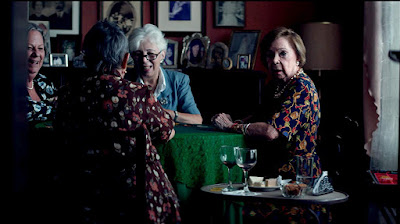I've been a fan of the films of Bertrand Bonello (shown below) for years now -- Nocturama and Saint Laurent are my favorites -- so it gives me no pleasure to report that his latest, ZOMBI CHILD, is an embarrassing, unadulterated piece of crap. Unless M. Bonello is simply having us on? If so, he's managed to con most of our critical establishment, no great achievement considering the current state of movie criticism. It is not that his film has no real scares, suspense or thrills, as do most films with the word zombie (or, as here, zombi) in the title. Nor that instead of those usual attributes, a filmmaker has skewed his work toward intelligence and politics, economics, and history. Robin Campillo managed all that just about perfectly in his zombie movie, They Came Back (Les Revenants).
Here, the history of Haiti, colonization, teenage infatuation, zombie love and other subjects bounce off each other repeatedly without ever making much of a connection -- intellectually or emotionally. It takes over an hour before that connection finally arrives. And once it does, the movie just grows stupider.
TrustMovies is sorry, but it is simply not enough to toss in everything you think you know about these subjects and then expect this to somehow coalesce. You've got to make your tale resonate in an edifying manner so that your characters seem at least a tad important, maybe even believable. Bonello utterely fails at this. Plus, he's unusually sloppy (our Haitian zombie forgets to move slowly, once he's washing himself in the river).
The movie, despite its intellectual pretensions, does not even qualify as subtle or smart, for it is simply exposition piled upon more exposition, until it arrives dead on its feet -- in a way that puts to shame its own zombies.
Toggling back and forth between Haiti in the 1960s -- as one of those zombies is created to join others in the sugar-cane work force -- and an elite girls' school in present-day France, where the entitled white students form cliques and discuss boys, music and sorority nonsense, deciding whether or not to allow a new black student to join, Zombi Child moves along at the pace of the old-fashioned undead. To and fro we go, from Haiti to France, with things occasionally broken up by a nightmare or a flesh-eating fantasy. Come on, Bonello, we know you can do better than this.
Even the film's minimal special effects are cheesy -- black eyeballs yet?! -- while the finale offers up the most embarrassing use of Rodgers & Hammerstein's You'll Never Walk Alone to ever hit the screen. It makes even the ending of the movie Priest seem unduly reticent.
I am tempted to call this film a piece of intentional camp. But, no, I know in my heart that the camp here in unintentional. More's the pity.
From Film Movement and running 103 very long minutes, Zombi Child hits DVD and digital today, Tuesday, May 19 -- for purchase and, I would guess, rental. Your move.





























































